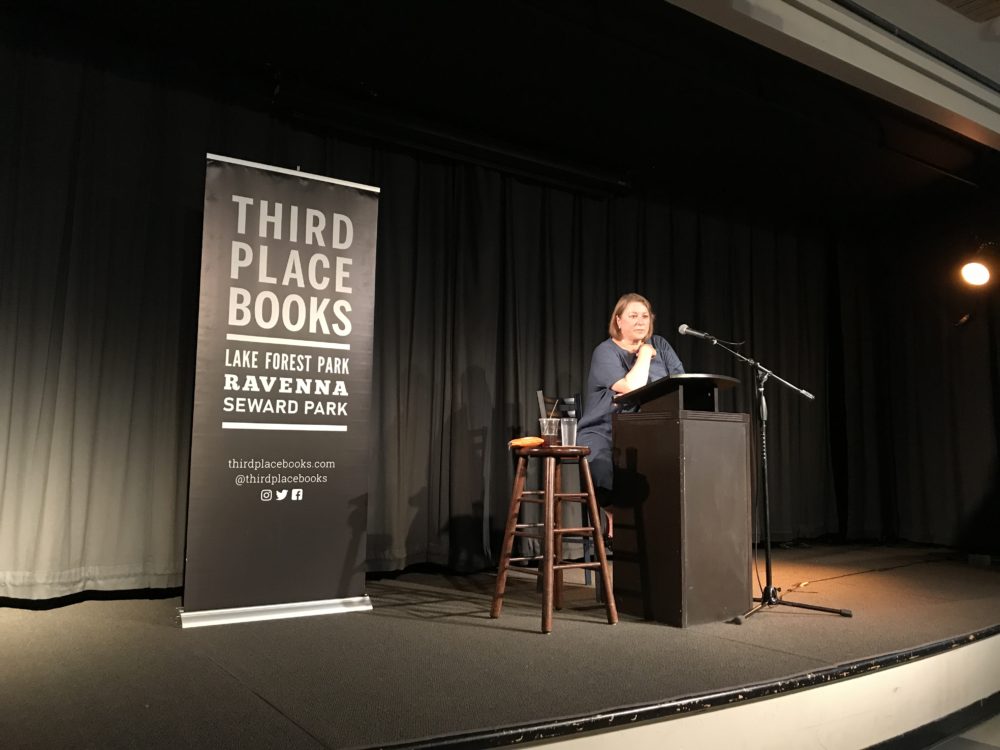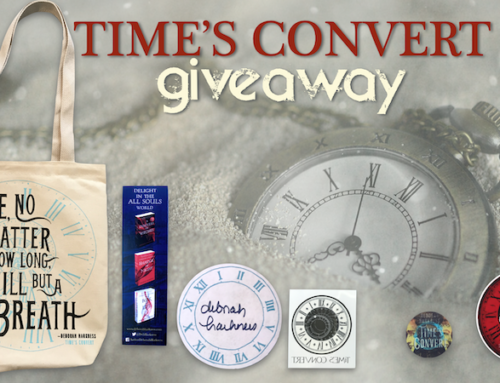Attending a book event with Professor Harkness is awe inspiring. Attending with friends is something you treasure forever. On July 1st, we went to Third Place Books in Seattle (Lake Forest Park), which was the last stop of the Time’s Convert Book Tour. The whole experience was greatly enhanced by the presence of Valerie from Daemons Discuss, Dana, one of the All Souls Con attendees in Cardiff, plus the lovely Wendy and Stephanie, and the amazing Jill. Deborah’s fabulous talk on the journey of the non-linear creative process was livestreamed from her author page on Facebook and we did our best to capture the lively Q&A that came after the live stream. We hope you enjoy it.
Posted by Deborah Harkness on Monday, July 1, 2019
Audience: I recently read a nonfiction book that you might want to check out.
Deborah: Sure.
Audience: It’s called Thinking Fast And Slow.
Audience: And it really talks about your moodling versus your creative, let’s get this down on paper. And it talks about how the brain science of the last five years have shown that that’s how our brains work. So you might find that interesting. The authors are Nobel prize winners in economics.
Deborah: Oh, cool. Well it’s interesting because I really do feel like if I try to cut down the slow thinking time, that it actually just makes everything slow. Whereas if I put enough of that kind of moodling time in place, and when I actually start doing this kind of work, it slides together pretty quickly. Again, for that I have a lot of help from this notebook full of little, 250 word, sort of little mini things that I write when I’m half asleep. Pulling this from some weird take on something I’ve done in daily life, but I look for that. That’s great.
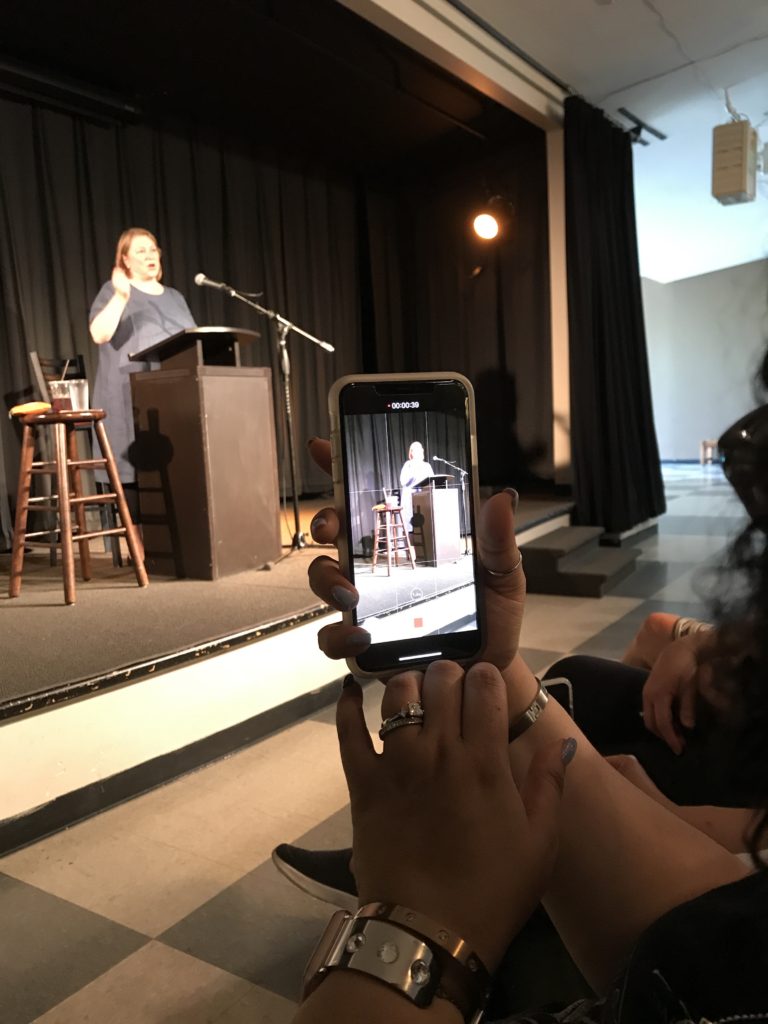
Audience: I have two real quick questions.
Deborah: Sure.
Audience: Has Gallowglass been cast for the season 2?
Deborah: No.
Audience: Oh!!!!
Deborah: Honest to God, he’s not.
Audience: Has Philippe been picked?
Deborah: No.
Audience: Did you always mean for Phoebe to hold a grudge?
Deborah: Well, here’s the thing, is that we are actually filming sort of around and about the modern storylines first. So what we’ve got is pretty much the cast from the first series, and part of right now, we’re working through sort of all those little modern chapters in Shadow of Night. So we’re trying to get that down first, which means that I just really don’t like to sit around on hold for large periods of time. And so it just means that we’re still a number of weeks, weeks and weeks and weeks and weeks and weeks away from starting anything that in a ruff and farthingale.
Deborah: So, and not to mention the sets and the costumes have to be made. So we really started up at the beginning, middle of May, pre production. We’ve done work before that. The writers were certainly at work in our department and things like that. But it’s like, in earnest, like on the site with set builds and stuff, is only about middle of May. And so we started … there was Sept-Tours in June, and doing that sort of more modern stuff.
Deborah: So a little ways to go. Yes?
Audience: Can you talk to us a little bit more about what you do when you do revisions?
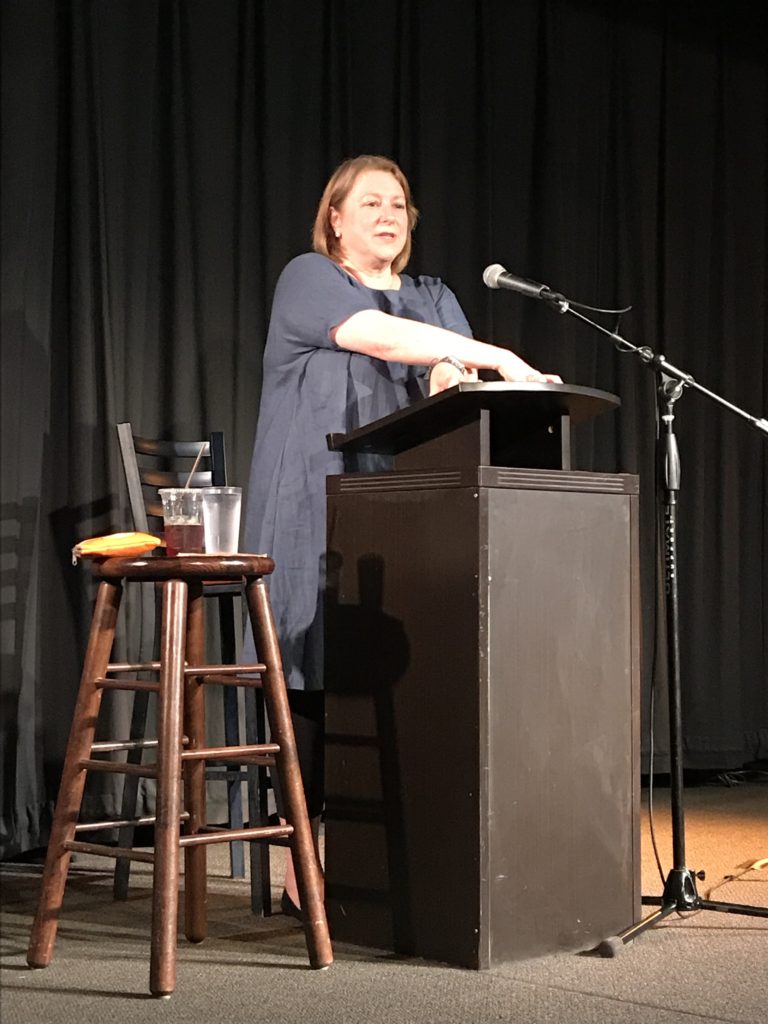
Deborah: Sure. Revisions. So the question is about revisions. So okay, I’m not going to lie to you. When I give my work to sort of my beta readers or my editors, I think, well, it’s obviously perfect. And they will have no questions or problems, because of course that’s, you give it away when is the best you can make it. And then it comes back and there is always, just tons and tons, I mean unbelievable amounts of things. And I cry. That’s normally the first step, is I just weep. And I think, oh God, no my perfectly beautiful thing and now it’s got to get all taken apart and put back together.
Deborah: But I actually love the revision process. And what I take to heart is something that Neil Gaiman, the great author has said, which is that every objection anybody has or any criticism anybody has is 100% right. But whatever they suggest to you to fix it is 100% wrong. And this has been very true. So what will happen is when I talk to … in the revision process what I have to do is be a really good listener. I need to look at those comments and think, okay, what are they really saying here? Because they’ll say something like, “Oh, I don’t think Marcus should have a blue car.” That played out.
Deborah: And I’m thinking, okay wait, is it that Marcus doesn’t drive? Is the car the problem? Is the color of the car? So I have to think about what it is that they’re trying to, sometimes I have to actually call the person on the phone and say, “What did you really object to about Isabella and Alice, the magical emporium?” To try to figure out what is really wrong so that I can figure out a solution that really fixes it.
Deborah: So there’s a lot of just basic copy editing. I have a terrible tendency to say things three times and only one of them is really necessary. So lots of deletions happen, because I said it one way and then another way, then I repeated it a third time but in a slightly different way, just to see.
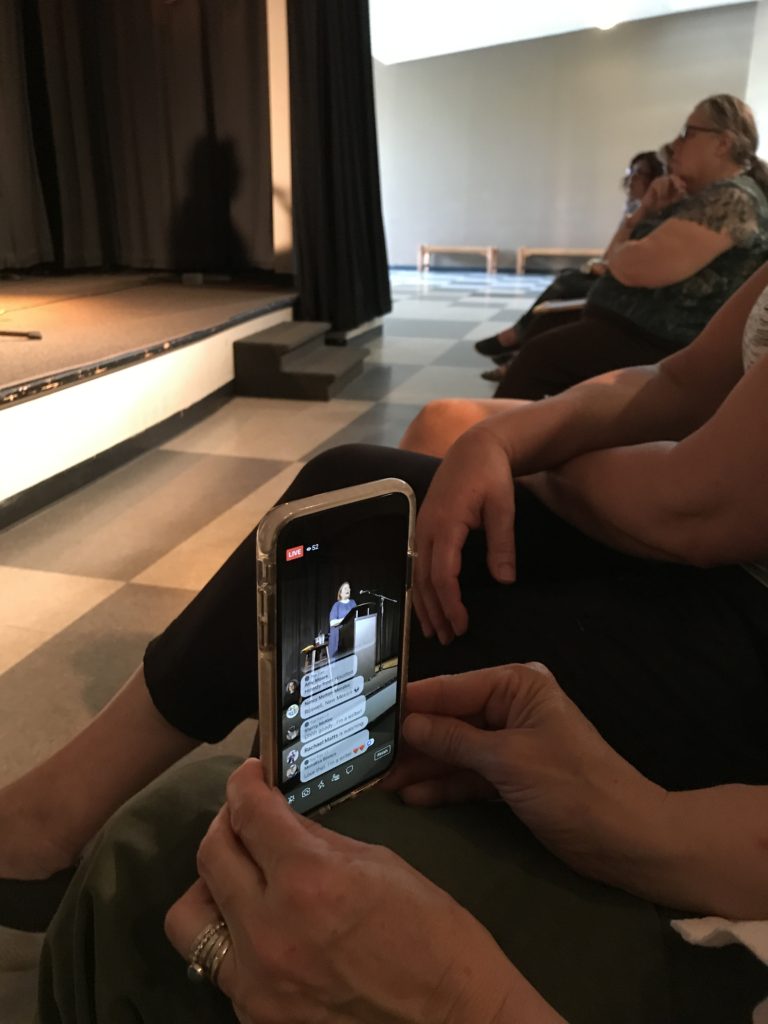
Deborah: So there’s a lot of that kind of deletion. But then there’s also these much thornier issues. And in my experience, one of the great challenges of revision is that you unpick one thing, it sends little, it frays the whole book. And so then you have to go chasing the thread down in all the others. And that’s where it can get really challenging. Often, because I unravel so many things in the second draft, the third draft is where things get knit back together. And some of the plot holes that I’ve reintroduced in kind of get addressed. And I would love it, except for bad days when I just wish I had never decided to write a novel, ever.
Deborah: And I just, the one thing that’s really for sure, though, is that I love … the second draft I think is probably the most important draft of my process. The first draft is just all joy and happiness and gliding down hills at high speed. Draft two is where all the hard work is done. And then the third draft is the sort of the polishing part of it. Where things start to really kind of sing and swing, and as a result draft two tends to be the hardest, but also the most important. Does that help?
Audience: Yeah.
Audience: Question, how did you come up with of the whole premise of the weaver, the threads, the whole story line? And how did you come up with this wonderful storyline?
Deborah: So the question is how did I come up with weavers and threads. The whole thing. The whole thing, everything in the books comes from a question. So it comes from the same thing as being at Whole Foods and thinking what would a magical superstore look like? As an historian, I only work off of questions. If I don’t have a question, I can’t get anywhere. So it really started in an airport in Puerto Vallarta where I saw an entire wall of fiction about supernatural creatures, and I thought, well that’s just silly. They all look like they’re having regular romantic relationships, they all look wealthy. They all look beautiful. Really? Where are these people?
Deborah: And I thought, if you were a vampire, again, I know people who are rejected from their family because they date somebody of a different religion. Really? You think you’re going to bring home a vampire and your families could be thrilled to bits? I don’t think so. So I just kept thinking, if you really were a vampire, where do you live? What do you do for a living? And how do you date? And every other [inaudible] was, oh, well what about this? And what about, would you be happy to be a witch? I don’t think so. I’m a historian, I’m here to tell you, not good.
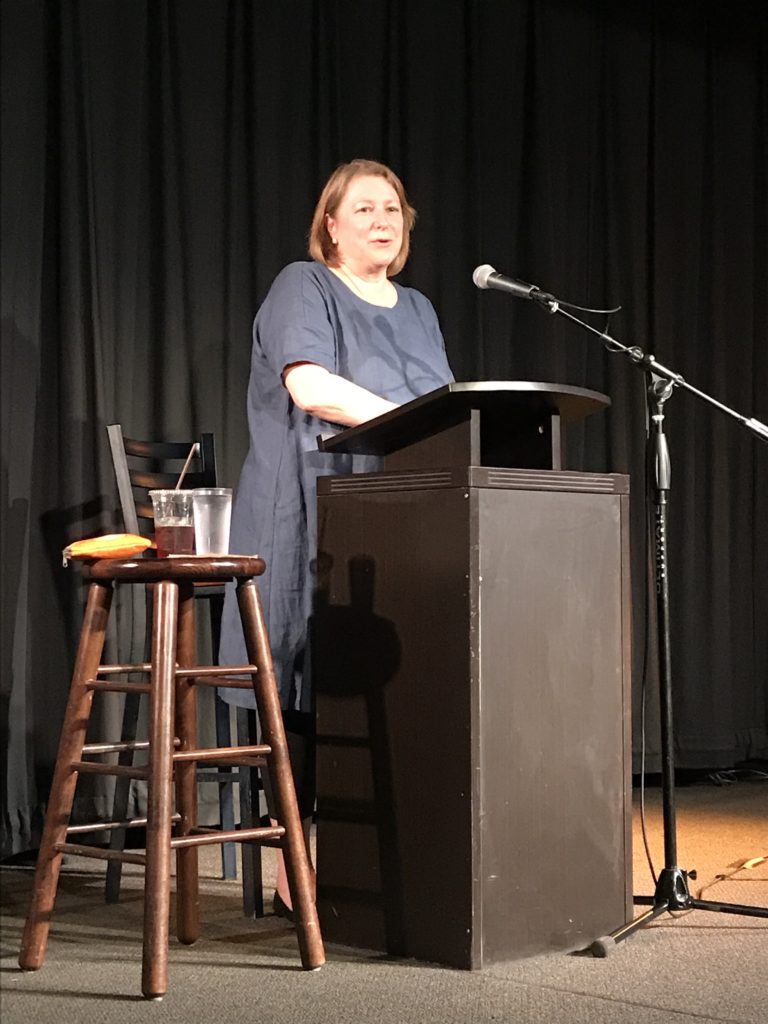
Deborah: So it was that kind of thing and at every turn. I just kept asking questions. Then I could imagine an answer that made sense. And that’s where I have the most fun. So it’s never been for me, I sit down and think, oh, I know I’m here to write a story about weavers. Oh my gosh, no. You know that comes way in some weird, twisting, labyrinthine kind of … Did anybody ever used to play that? What was it called? That old computer game, it was like 1985, were there was a blinking cursor and it’s, there was something you are so and so that there is a mailbox. Open the mailbox.
Deborah: Do you remember what I’m talking about? Wasn’t there like a Z in the title. It’s like, yeah. It was like the original Pokemon.
Audience: Zork.
Deborah: Zork. It’s like a game of Zork. Where you’re like, I open the mailbox. Then you’re, there’s a red letter in the mailbox. Open the red letter. That’s where [crosstalk] Yeah, that was ripped right out of some kind of [crosstalk]. How scary.
Audience: So I’m always curious about your level of detail and the level of that, and I appreciate that. And one the first things I kind of conquered, just reading about the Madame Hardy roses and the [inaudible] down there. I was curious if you could just talk a little bit about choosing that, and also how the white symbolism seems so prominent in themes.
Deborah: So, what’s the question?
Audience: White symbolism, using white.
Deborah: Using white? The color white? Okay, so I’ll do the white first. White has all, white light has all the colors in it. So one of the big themes of all the books is none of us are pure, and that we are all way more diverse and way more interesting, and we contain all the spectrum of everything. And so I use a lot of that. That’s a good old Newtonian optics experiment, break white light down into a prism of color. But I love playing around with ideas of purity and mixture and boundaries and what people think versus what actually is real.
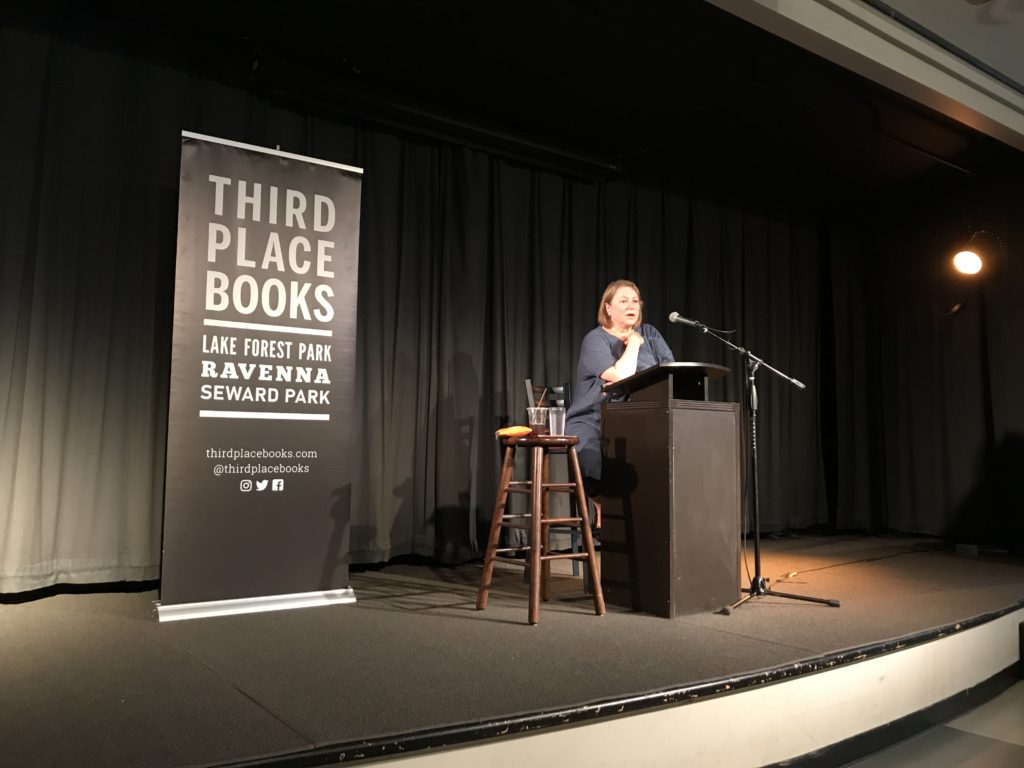
Deborah: So that’s one of the reasons that I played with that. In terms of the other details, one reason there’s Madame Hardy roses and praise gardens, is because I have them and I love the scent of them. So I can write about them with a certain degree of firsthand knowledge. They’re also great period roses and the kind of thing that she would like.
Deborah: But yeah, so again, they always say write what you know. Which sounds kind of limiting, but actually if you think about it and not in terms of, well, I don’t know much except for being a history professor. First off that’s actually quite a lot if you sit down to write a novel. If you just kind of break it down into things that are completely normal for you, but may not be normal for other people. Or it just happened to be because you have this meticulous sprawling rose bush in your backyard that you are at war with.
Deborah: And so you think, well, wouldn’t it be nice if it was actually an orderly rose bush, and you know what I mean? Or a great rose garden, but you are not. And put it in a book. So it’s just a lot of fun to kind of pull in those details, and I think it just gives it a sense of authenticity and “groundedness” that it wouldn’t have if it was just a rose. Right? Or at least it wouldn’t for me.
Audience: How do you feel, or do you feel like your characters in your show are different than what you imagined when you put the on paper? And were you part of the picking process of getting them?
Deborah: So the question is about the characters as they’re portrayed in the television show. And what role I have in them versus the book.
Deborah: So here’s the thing. I am an executive producer. I’m a very hands on executive producer, and I was part of every single casting decision that was made. So, and here’s the thing. When I went into the casting, I was very adamant that we never casted for appearance. If we could find an absolutely superb actor who happened, like Matthew Goode or Teresa Palmer, to be exactly the way I described them in the books, aces. But if we had somebody who looked the part but was not the best actor, I was like, no. Because really what you want is just somebody to embody the spirit of the character. None of us, nobody in this room wants to be judged for their appearance. So why would we do that to a superb actor?
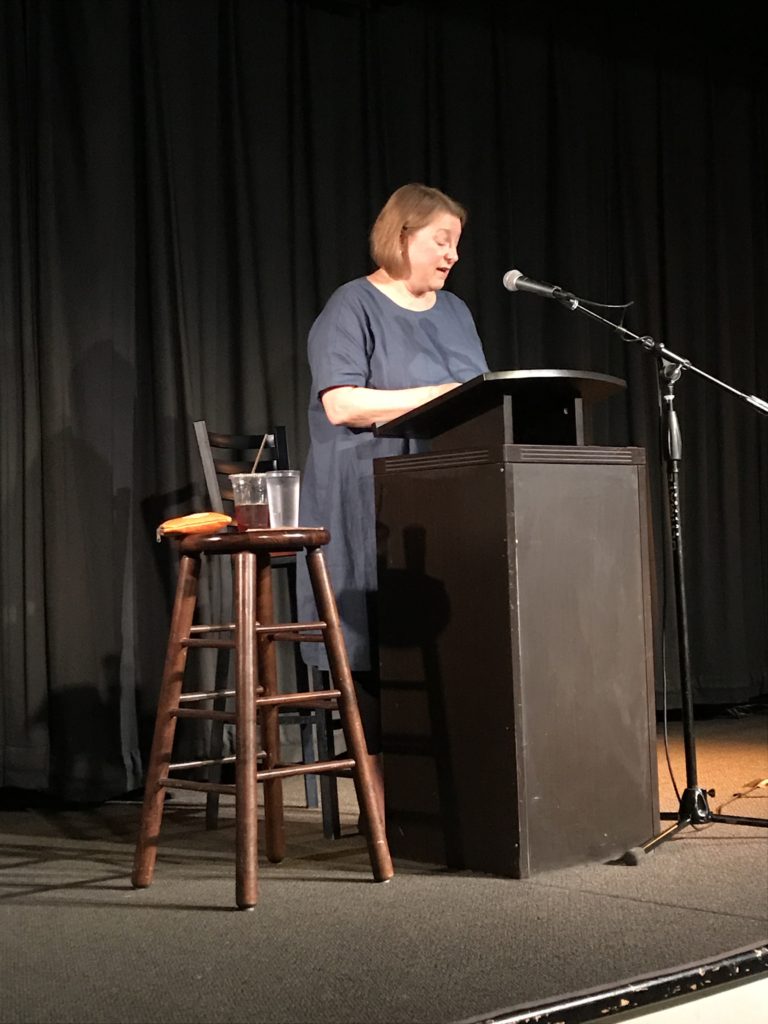
Deborah: I mean, we tried to stay in the ballpark of the possible, but you know what? People have very complicated career lives, and a lot of the people you all sort of suggest, they’re frankly working on other projects. So scratch any Game of Thrones actor. Right? So it was just like, pages of casting decisions. But the one I’m thinking, yeah, right. In our lifetime, we’re never going to get any of these people to be available.
Deborah: So we also have a lot of fun trying to pick people who are perfect, who maybe you haven’t seen or you haven’t seen for a while, and getting them up on the screen. So in the case of Adelle Leonce, who is Phoebe Taylor, I mean I only had to see three minutes of one of her auditions. She’s Phoebe. Absolutely.
Deborah: And that’s been the way it’s been with all the characters, to my great credits, to my great happiness, I mean.
Audience: So have you ever had an actor you saw on a reel that when you saw them maybe on set wasn’t quite what you thought it was?
Deborah: Never, never. They are, because what they’re doing on the reels is being the character with no costumes, no props, no scenery, no nothing. If they can pull it off on an audition reel sitting in a tee shirt and sneakers, they can do anything. And it’s really amazing. Almost always somebody will just stand out and own that part. And you’re like, oh my, it’s just breathtaking when it happens. Because you’ll watch eight or 10 and nine will be great, but they just don’t nail it. And then one, you’ll be like, oh wow, that’s it, that’s the one. So yeah, it’s an amazing process. I mean it is amazing what they do. It is really alchemical sort of.
Deborah: So a hand over here, yes.
Audience: This actually would have gone to your [inaudible] on the revision process. And I have a feeling that because you’re a history professor, it’s probably a little bit easier for you. How [inaudible] like your character? How do you do that? Because I get lost, I use OneNote, and I have notebooks and notebooks and notebooks, and I get lost within that process.
Deborah: I use paper. I’m serious. I can’t do any of that stuff, it fries my brain. I spent so much time tracking things and putting things in search engines and I don’t know why, but if you have a notebook and an index in it, it’s really easy to find things.
Audience: Right.
Deborah: So I use the notebook for the continuity part. For the character part. You know, my characters just feel very real to me. They feel like people I really know. And I will use music to kind of get a handle on a character’s emotional state. So I’ll pick a song that sums up how they’re feeling. And say I’m working on a chapter, and it might take me seven days to work through that chapter from beginning to end. I will listen to that song the whole week.
Deborah: So I will listen to it for my 30 minutes on Monday, and then I put it back on and I get right back in the mood. And that’s how I keep the emotional continuity, which for me is much harder than tracking the other kind of stuff. The other thing to remember, though, is that if you can’t keep track of it, it may be too complicated. And that’s when you just have to start being ruthless and cutting it apart a little bit. Because it’s sort of like having a kitchen cabinet full of 300 pots and pans, and you can’t find a frying pan. Right? You know it’s in there somewhere, but maybe if you only had the frying pan and the pasta pot, you could be in and out of there a little faster. So yeah, that might be a place for some editing. Making it less complicated. Not more. Great question.
Audience: How did you curate the images that you have on your iPad, and are they, did you create photographs or are you inspired by certain artists?
Deborah: Great question. This is about the images on, that I’ve used for my sort of slide show. Some of them are images from the web. Some of them are images I’ve taken. Some of them are works of art, but honestly most often, they’re things and places because I’m a very sort of place oriented person. So that’s usually what is there. A building, a street, light hitting a doorway, light coming through window. It’s weird stuff, as opposed to a whole big work of art that tells a story. For me, because one of the things people would ask me is “What book are you reading?” I was the one that you’ll be reading in another two years.
Deborah: I can’t hold other people’s stories and I can’t watch television and I can’t read when I’m writing. I can read nonfiction, but I can not read anything that has a storyline in it because I’m supposed to be making up the story. And so my images tend to be very sort of spare and almost abstract, as opposed to something that’s like a period artist or something like that. But great question. Very good question.
Audience: You talked about Matthew surprising you with [crosstalk] How often do your characters do that versus how much do you plan for them to-
Deborah: Oh no, no. Okay, the question is how often do characters bother me and interrupt me versus my carefully laid plans for them? Well, they say that there are two kinds of writers, plotters and pantsers. People who plot everything out and people who fly by the seat of same. And I’m a pantser. But in addition to that, I have never ever had a character who did what I wanted them to do. And that sounds really weird and kind of like precious artsy, oh, what’s she talking about?
Deborah: But honestly, I had no plans for Hamish at all. Matthew didn’t have friends in my world. I had no plans for Gallowglass. I was just frankly really, really ticked off with Kit Marlowe. I really am sick of him. I’m bored with it now, and I can’t believe I’m going to have to write a whole novel with these people in it. And suddenly as I’m typing, the door blew open. And there he was, and I thought, ooh, you can stay.
Deborah: And then all writing came to a halt for two weeks, because I had to think about, well who is he, and what is his theme, and what is his name? But then once he was there, there was no way. So I had literally, Isabella and Alice, I mean, what? So I didn’t have any plans for anything like that in my mind. But some of the best things come from those moments that are just sheer, creatively fun, unexpected. And that’s because I think if I’m not having fun, and I’m not being surprised, then you’re not going to be either.
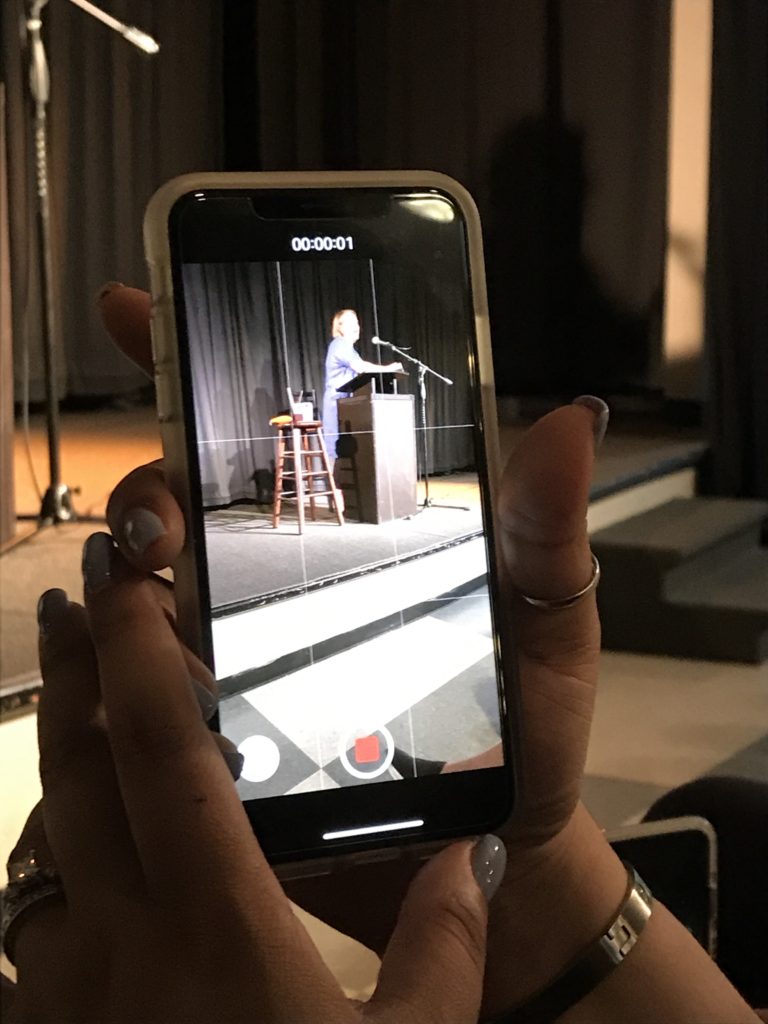
Deborah: And I don’t know if you’ve ever read books like this, but books that seem like they’re so meticulously worked out in advance that you’re actually kind of feel like all the interesting stuff has been beaten out of it by the time it gets to you. And I don’t want to ever do that. I don’t want to get to that place where it’s so immaculately, hermetically sealed as a thing, that it just kind of lays there dead. I like it when the door blows open.
Deborah: I still remember the time when Hamish, when Matthew got in the car, but I came out of my office at work and I said, “Matthew got into the car. He’s driving.” My colleagues didn’t even know I was writing a novel.
Deborah: They’re like, good. Completely lost it. One of them of kindly said, “Where’s he going?” And I said “I don’t know.” It’s a little bit mad on the ground floor at the office at USC but then I literally, I think that’s what makes it fun for me, and that somehow that sense of excitement can, I can somehow keep it on [inaudible] box. I don’t revise it too much to go back to the root of your question.
Deborah: We have time for maybe one or two more questions. Yes?
Audience: It’s a two parter. On the season two and three, is it still going to encompass just the Shadow of Night?
Deborah: Season Two is Shadow of Night. Season Three is Book of Life.
Audience: Wow. Okay. Then, the second question doesn’t matter.
Audience: That’s what I was going to ask, was if the Shadow of Night was two and three seasons, or would you cut it in half?
Deborah: Oh. Yeah, no. It’s going to be just season two.
Deborah: I think there will be more than eight episodes. I think that I’m not sure we can smush it all into itself, so I think that is part of the plan.
Deborah: Yes. Right over here.
Audience: [inaudible] TV shows and the books, [inaudible] At the time a certain part-
Deborah: or big ones.
Audience: When that happens, is that the nature of the TV show or do you sometimes make it kind of like you read it in the books?
Deborah: Okay, so this is a question about the changes from the television show to the book, which is a great question. Here’s the thing guys. The television, the book is all in the first person. It’s all from Diana’s point of view and a lot of it is in her head and she’s pretty clueless for a large part of the book. And so I have this really horrible vision of a woman on a bicycle riding around Oxford with a voiceover, thinking, and then going to the river and rowing with a voice over. “I’m going to the library” said the voice over. I’m like this will be the worst television show anyone has ever made, ever.
Deborah: So, when I first went in I said, I got to tell you this guys, I think it’s really imperative you don’t you this from Diane’s point of view. Because while Diane is cluelessly walking around, going to yoga and washing her clothes, major peak forces are gathering against her. I know that’s happening because I have to plot all that out. It’s not in the book because it’s in the first person, but there’s a whole world out there that is swinging into action because of what happened. And I think we need to show that and I think we need to build it, because otherwise, here’s what was going to happen. Otherwise it was all going to either be, have to amp up the romance and make it, will they or won’t they? And it would have been very conventional romance or it would’ve been very violent.
Deborah: Something would have needed to happen to up the drama, right? And I thought it was a better idea if the drama was upped by having that sense that you know by the time you get to the end of the book, you know, Oh boy, they’re in trouble. There’s all these people who are opposing them. But in the show, if we could show that from the very beginning that we weren’t going to have to fall into the kind of conventional tropes of lots of blood, lots of vampire [inaudible], all that kind of stuff that we just don’t need more of in the world. So, that was really the decision making process. And I have to say it’s kind of my fault. So if you don’t like it [crosstalk] I mean I think that the writers did a fabulous job and it gives us, I think, oh, just all this delicious stuff that we know must’ve happened.
Audience: Please tell me that you’re not planning to cut the scene with Matthew’s father, in the barn.
Deborah: I don’t know because we haven’t gotten that far, but I tend to that if we feel we can’t do it, like the yoga scene, we don’t do it. And we all wanted the yoga scene, teams of people worked for months on please dear God, let us … And in the end there was no way to do it that wasn’t actually just going to look goofy. People in lotus position floating in the air and physically, some horrible I dreamed a genie floating. And so we just thought, it’s better to just leave that to the imagination.
Deborah: Now in the case of Matthew and Philippe fighting in the barn, I think you can probably make a compelling argument that a lot of people would have fun reenacting that. And so, I think the chances are pretty good of seeing that on screen. But obviously, we’re not going to see everything because there’s going to be some things we just can’t do convincingly, given budget, timing, insurance policies.
Deborah: If I could not get to your question, I will see you very shortly in the signing line, but thank you guys for being such a great audience.

